The cost of turning your life into content—and how I finally crashed out
I walked away from my six-figure Instagram and my life got exponentially better
The day I had to put my dog down, a post went out on my Instagram feed that showed me smiling in an ad for face cream.
Not because I’d posted it that day—it had been queued up in my scheduler app weeks earlier, part of a brand partnership I’d committed to back when that date was just another square on the calendar. But there it was: me, smiling at the camera, glowing skin, enthusiastic caption about hydration and self-care, while I was actually sitting on the floor in a vet’s office holding my dog as she died.
Nobody who saw that post knew. Why would they? The whole point of what I was doing—what I’d gotten really, really good at doing—was making sure nobody ever knew. The performance was the product. The life was just the raw material I mined for content.
I started using Instagram as a business platform in 2020 when the pandemic killed my marketing agency. Most of my clients were in hospitality, and when the government forced shutdowns, my revenue went to zero almost overnight. So I pivoted to social media because… well, I was good at it. I’d just spent the last few years doing marketing for clients so I figured, why not try it for myself? I grew my account from 1,000 followers to 35,000 in about 18 months. Brand partnerships, sponsorships, affiliate deals—before I knew it, I was making tens of thousands of dollars a month. The trajectory was insane. I was winning.
Except I wasn’t.
There’s a Black Mirror episode from 2016 called “Nosedive” that I think about often. In it, everyone rates every interaction on a five-star scale, and your score determines everything—where you can live, what you can rent, whether people will even talk to you. The protagonist, Lacie, wakes up and immediately checks her rating. 4.2. She scrolls through her feed, carefully liking posts, leaving enthusiastic comments, performing joy at other people’s vacations and babies and promotions. Every interaction is calculated and every emotion is optimized for maximum approval.
Lacie’s at a coffee shop and the barista hands her a latte with foam art. She gasps with exaggerated delight, snaps a photo, and posts it with the perfect caption. She rates the barista five stars. The barista rates her back. They both smile with their mouths but not their eyes. It’s a transaction disguised as a moment. She’s not actually tasting the coffee, she’s just thinking about how many points it’s worth.
I lived inside that episode for 18 months.
Every experience became about creating content. I’d go to the Strip and think, “I have this pair of pants I’m supposed to shoot that would look good with the Cosmo aesthetic, so I guess I can make content while I’m there.” Not “I’m going to have fun at the Cosmo.” Not “I’m excited to see my friends.” Just, what can I extract from this experience that will perform well? (Sigh.)
I got invited to events as an “influencer,” which meant making content wasn’t optional—it was literally the job. The currency of admission. Everyone at these events was doing the same thing: performing. The whole room was Lacie at the coffee shop on steroids, gasping with exaggerated delight, phones out, capturing the perfect angle. I saw behind the scenes of it. The girl who looked effortlessly joyful in her post had just been crying in the bathroom about her boyfriend. The guy posting about gratitude and abundance was having a panic attack about money an hour earlier. We were all just... lying. Professionally. For points.
In “Nosedive,” Lacie wants to rent a luxury apartment, but her score isn’t high enough. She needs to be at least a 4.5. So when her childhood friend Naomi—a 4.8—asks her to be maid of honor at her wedding, Lacie sees an opportunity. A heartfelt speech in front of Naomi’s high-status friends could boost her score enough to get the apartment. She doesn’t actually like Naomi that much; Naomi dropped her years ago when Lacie wasn’t useful anymore, but that doesn’t matter. What matters is the number.
I remember chasing that number, too. I’d have a terrible day—actually in the shower crying about some existential crisis—but something would be “due,” so I’d have to pull myself together and make a stupid, happy little post about how much I loved whatever product I was contractually obligated to promote. The performance required cheerfulness and gratitude and a version of myself that was focus-grouped for maximum likability, maximum engagement, maximum revenue.
And the fucked up part is that I was good at it. I knew exactly what would perform. I knew which captions would get engagement, which aesthetics would convert, which personality traits to emphasize and which to hide. I’d optimized myself like a product listing, but somewhere in the optimization, I’d lost track of what I actually thought or felt underneath the performance. I wasn’t a person anymore—I’d become a brand. And brands don’t have bad days. Brands don’t grieve. Brands post face cream ads on schedule.
The thing about living this way is that it doesn’t stay contained to your “work.” It colonizes everything. I’d be at dinner with friends and realize I was narrating the experience in my head as if I were posting it. Not actually posting—just pre-drafting the caption. Workshopping which details would sound good, calculating which photos would perform. I wasn’t having the experience, I was producing content about the experience.
I’d watch other groups of people sit down at restaurants and the waiter would put their meals down and the whole table would go into this weird mode where they were suddenly together but all alone, everyone silently photographing their food from different angles, no one talking, no one eating, just... performing the having of a meal for an invisible audience. Then they’d all look up, put their phones down, and resume the conversation like nothing weird had just happened. Like that wasn’t completely deranged behavior.
Nobody was forcing any of us to do this. We weren’t being made to turn every experience into content, we were just... doing it. Voluntarily. Compulsively. The algorithm had gotten inside our heads and was running our behavior. Money in bank go up—so you post the thing. Everything was just raw material for a future post.
Everything falls apart for Lacie when she tries to get to Naomi’s wedding, but her flight gets cancelled. When she tries to rent a car, the agent looks at her score—now a 4.2 because she got visibly frustrated at the airport—and tells her she doesn’t qualify for the rental. Lacie is perfect politeness, perfect pleasantness, doing everything “right,” but the system has arbitrary rules she didn’t know about. She asks to speak to a manager. Her score drops to 4.0. She’s actively being punished for having a normal human reaction to being fucked over in real time.
Unable to rent the car, she ends up trying to hitchhike. People slow down, see her dropping score, and just keep driving. She’s the same person she was an hour ago, but the number has changed, so now she’s untouchable. The score was supposed to measure her value, but really it just measured her compliance. And once she stopped complying—once she showed frustration, exhaustion, anything that wasn’t relentlessly positive—the system locked her out.
My version of this happened slowly, then all at once. The influencer events started making me physically cringe. Watching people perform joy for brand activations while their eyes stayed dead. Watching myself do it. The gap between what I posted and what I felt became unbearable. I was making incredible money—my growth trajectory was genuinely insane—but I felt like I was prostituting my life. Every moment had been monetized. Every emotion had become a performance. Nothing was mine anymore.
I value authenticity more than anything else, from a first principles perspective, so I’m ashamed to admit this was the least authentic I’d ever been. I was standing in the shower after posting some cheerful brand content one evening, and I just thought: what the actual fuck am I doing? This is disgusting. This feels slimy. This is everything I claim to be against. I’d turned myself into a performing seal, and I was doing it to myself. All in pursuit of making the magic numbers on the magic screen go up.
By the time Lacie finally reaches Naomi’s wedding, she’s a disaster. Dirty, disheveled, score plummeting, but still trying. She crashes the reception, grabs the mic, starts her rehearsed maid-of-honor speech—the one she wrote to boost her rating. But something in her snaps.
She stops saying what she’s supposed to say. She stops performing. Instead, she tells the truth: that Naomi was a terrible friend, that their whole relationship was transactional, that she’s been faking enthusiasm for so long she forgot what real feelings even are. The bride is mortified. The guests are horrified. Security drags her out while her score craters—but she looks relieved.
About 18 months after starting to use Instagram as a source of steady income, I ended up deleting everything from my account. Just wiped it. I had upcoming brand partnerships that I ended up bailing on because I couldn’t take it for one more second. I disabled the whole thing for a few years because it felt that gross. I could have kept going—the money was there, the trajectory was there, the opportunities were multiplying—but it felt bad. Like fundamentally, spiritually bad. Like I was trading my life for likes, or letting an algorithm decide what I thought about, what I did, how I spent my time, what deserved my attention.
At the end of “Nosedive,” Lacie ends up in a cell across from another detainee whose score is just as destroyed as hers, and they start yelling at each other. “Fuck you!” she screams. “Fuck you!” he screams back. And they’re both laughing. It’s the first genuine interaction either of them has had in god knows how long. No one’s rating them anymore. There’s no score to optimize. They’re finally free to just... be. Angry, messy, authentic, real.
That’s what disabling my account felt like. I was Lacie screaming “fuck you” at all the brand collabs, all the performance anxiety, all the time I’d spent turning my life into a prop. And it was the first time in 18 months I felt like myself.
I’m on X now, which is still social media but feels different. I joined in 2023 because I thought it might be a way to share thoughts without the performative aesthetic labor that Instagram demanded. No photoshoots. No carefully curated grid. No brand partnerships requiring me to smile while I’m falling apart. Just thoughts. I think something, open the app, hit send. Sometimes I’m sassy, sometimes I’m serious. It’s still a bit of a performance—everything public is—but it’s a performance of my actual thoughts rather than a performance of a person I’m not.
While I’m no longer making tens of thousands on Instagram, I’m so much happier. I write on Substack now (hello!)—long essays where I can actually think through ideas instead of compressing everything into aesthetic bite-sized content. My social presence is my thoughts and my writing, not my life as a prop. Nothing has to be “content-worthy” anymore. I can go to dinner and just... have dinner. I can have a bad day and just have it, not perform through it or package it for engagement later.
What I’m trying to protect now is presence. The ability to have an experience without immediately narrativizing it for an audience. To feel what I feel without calculating how it would perform. To say “this isn’t for public consumption” and mean it. To have a self that exists outside of how it’s perceived.
The thing about Lacie’s crash out is that she had to lose everything—her score, her reputation, her carefully curated persona—before she could remember she was a person and not a rating. You shouldn’t have to blow up your life to remember you have one, but sometimes the performance is so total, so ambient, so rewarded by everyone around you, that you can’t see it until you’re standing in front of what you’ve become and feeling disgusted.
I’m glad I only lasted 18 months in that world before the disgust became unbearable. Some people never leave. They just keep optimizing, keep performing, keep chasing the number up while their actual life—the one that’s happening underneath the content—atrophies from neglect.
The real question isn’t whether you use social media. The question is: Are you living your life, or are you producing a show about someone living a life?
Once you see it, you can’t unsee it. Once you notice how exhausting it is to maintain the optimized version of yourself, you can’t just go back to performing. Once you realize that nothing in your life is actually present because everything is being saved for later, processed for content, narrativized for engagement—you have to choose. Keep performing, or reclaim your life.
I chose to reclaim mine. Deleted the account, walked away from the money, let my follower count drop. And for the first time in over a year-and-a-half, I could finally breathe again. I could have experiences without narrating them, and feel things without performing them. I could be myself without calculating whether that self would get good engagement.
The performance is exhausting, but the authenticity is free. And the sooner you realize the difference, the sooner you can stop living for an invisible audience and start living for yourself. Because your life is not content. Your grief is not a brand opportunity. Your joy is not a metric to optimize. And the version of yourself that you perform for engagement is not the version that gets to be happy.
The score is arbitrary. The number floating above your head means nothing. And the sooner you let it drop to zero, the sooner you can start building a life that’s actually yours.
—S
PS: If you enjoyed this post, I recommend “Embrace your cringe and let it set you free,” or “Avoidance is a payment plan with compound interest” next. x






Cool! I like this one. Im actually starting in this social media stuff, and I can see what you mean. Balance is key but where do I put the weight, you know? Money is more important for at least the very beginning and staying off the 0 Balance. Because you don't wanna die. So when is it "safe enough "? This post made reflect on this, hoping to get to that point but also not really or have this in mind when that moment hits. Great read tho. 📚
The real question isn’t whether you use social media. The question is: Are you living your life, or are you producing a show about someone living a life?
Live your life and be present not a product for someone else. The best gift you can give is your undistracted self.
Thanks stepfanie for writing this piece.